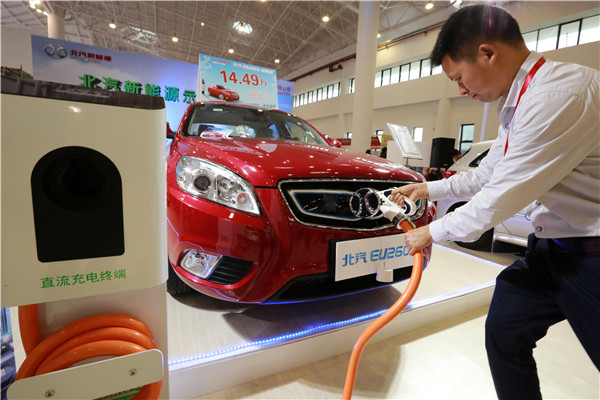 |
|
A worker charges an electric car at an auto expo in Haikou, Hainan province.[Photo/CFP] |
An auto rental service that uses only electric cars is now ready for nationwide expansion after what the company called a two-year successful trial in Wuhu, East China's Anhui province.
The business model was launched in 2014 by the Wuhu-based Eakay Electric Automobile Rental Co Ltd.
Eakay customers can rent cars via an app and the drivers and rental agency operators do not need to meet in person, avoiding lengthy paperwork and other inconveniences of the traditional auto rental business.
The customers can drop off the vehicles at any of the 55 spots in Wuhu's 110-square-kilometer downtown area.
Eakay now has a fleet of more than 1,100 electric cars, all made by Chery Automobile Co, which is also based in the city.
Eakay has begun an aggressive expansion plan that will see the number of cars increasing to 3,100 by the end of the year and the company opening branches in 50 cities in two years, said President Yan Daoyuan.
Initially, the new branches will be in third- and fourth-tier cities.
"During the two years of trial in the city, our cars have been used more than 20,000 times," said Yan.
"Though the government wants very much to promote electric cars, many people still don't want to buy them because of multiple concerns. The rental will be a good opportunity for them to try such a new-energy car."
To rent a car, customers need to pay only 15 yuan ($2.32) an hour and 65 yuan for a day.
China's car rental sector has been on the fast track in recent years, while Eakay executives said they believe that the battle for the domestic car-sharing market has only just begun.
"Competition comes from not only the domestic players, but also the global competitors," said Tan Yi, cofounder and chief operating officer of Eakay.
German carmaker Daimler AG last Friday launched its car2go rental service in Southwest China's Chongqing municipality, allowing users to park their Mercedes-Benz Smart cars, some 400 in total, anywhere in an area of 60 sq km in the city after use.
"The Chinese car-sharing market is still developing, but it bears high potential. It is expected to grow around 80 percent per year until 2018," said a 2014 report by Roland Berger Strategy Consultants GmbH, a global consulting firm.
"In the near future, only station-based business models with closed community consumer groups will suit the Chinese market conditions," said Andreas Maennel, principal at Roland Berger Greater China.
"This approach will reduce the number of required vehicles and amount of initial investment. Only when general awareness and network density increase might a free-floating model become feasible," the report added.
Yan said Eakay is now "very close to a free-floating model since an easy-to-reach network is already in place and the service spots will be increased to about 200 by the end of this year."
The company has also built more than 1,000 charging stations, each allowing two cars to charge at the same time. Another 2,500 will be built this year.
The charging stations are also open to private electric-car owners.
"Lack of charging facilities has always been one of the most important factors hindering the promotion of electric cars in China," said Tan.
"Such a market-oriented practice will be more effective in tackling the problem than government regulations stipulating certain number of recharging posts in the neighborhood," Tan added.
